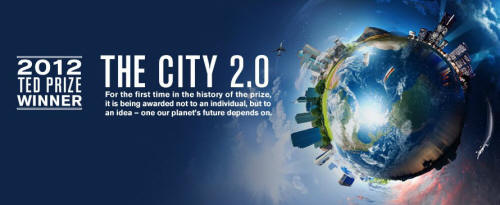|
from LandDestroyer Website
The idea of directly participating in the shape of your future is in essence the embodiment of human freedom.
By doing this through creating teams and performing
experiments, designing, and building solutions yourself is by far
superior to stuffing a piece of paper into a ballot box. However, if
the final goal is already predetermined, and resources regulated to
ensure that goal is reached, the process becomes tainted.
A first-person "wish" is made from a city's point of view stating,
Those who watch TED Talks on a regular basis will know that it is a mixed bag of truly innovative and inspiring ideas along with the corporate-fascist peddling of people like,
...masquerading as
humanitarians and environmentalists.
Then there are talks like that of environmentalist
Stewart Brand attempting to sell the merits of packing people into
squatter cities, also known as slums.
They claim they will preserve it as humanity's heritage, but they also claimed Iraq had weapons of mass destruction and that Libya's rebels were the "heroic forces of democratization."
To literally bet the farm on
their integrity now would be foolish at best, especially when
corporations like
Monsanto and Syngenta lurk behind governance both
on national levels and the international level at which the UN
operates on.
This includes,
...whose board of directors includes equity managers, members of the fraudulent Clinton Global Initiative, and other Fortune 500-funded "NGOs."
This further raises
suspicion over the true agenda of City 2.0.
Ultimately, however, while improving conditions within
urban spaces is a necessary task, the city is most definitely not
the "crucible" of humanity's future.
This convenience is the primary reason why people live in cities, the primary reason they trade in open-space, clean air, nature, fields to grow their own food in, and the degree of self-reliance and community enjoyed by rural people.
These advantages of the city have already been blunted if not
entirely negated by modern technology.
This is
accomplished without even the power needed by the most efficient
"City 2.0" mass transit systems being proposed, with a negligible
"carbon footprint" (if such a thing was even relevant), and allows
the Oklahoman to sit on his porch and overlook open fields, enjoying
clean air once his work has been sent via email.
No longer do you need to physically occupy Massachusetts to have access to the talent, ideas, and knowledge converged there.
Here in Bangkok, Thailand, I can just as easily access MIT's OCW
material as I can in any village in Thailand's vast countryside. No
city is necessary, nor a commute to class, just an internet
connection.
The
real cause TED should be taking up is not polishing and perpetuating
this symbol of inequity, but finding out ways to provide for people
outside of cities to enjoy with technology what only physical
proximity could have afforded them in the past.
Like the Internet, it will have physical systems supporting it, which will be ever changing, decentralized across the globe, and out-of-sight for the most part. City 3.0 will be a civilization whose collaboration, work, education, entertainment, economic activity, and ideas are unfettered by geographic location and grandiose infrastructure.
Technology can and will provide people
with what they need on a personal, local level while physical cities
will become superficial and, unless some new purpose is found,
essentially useless curiosities.
If people would like to waste time on an already outdated model, trying to convince people to perpetuate antiquated centers of ancient commerce in a digital world where ideas can literally be transported at the speed of light and manufacturing technology localized to then literally print those ideas out as physical, useable objects, that is their right.
However, for those enamored with TED's well-intentioned-sounding proposal, they must realize City 2.0 is already tired, worn out, and in need of replacement.
Upgrade to 3.0...
Especially when it is essentially a roadmap to post-scarcity and a world without corporate oligarchs? Most likely not.
It is something we the people will have
to contribute to and work toward ourselves, lest we resign our
future to tired oligarchs intent on maintaining social, financial,
and geopolitical domination.
|

